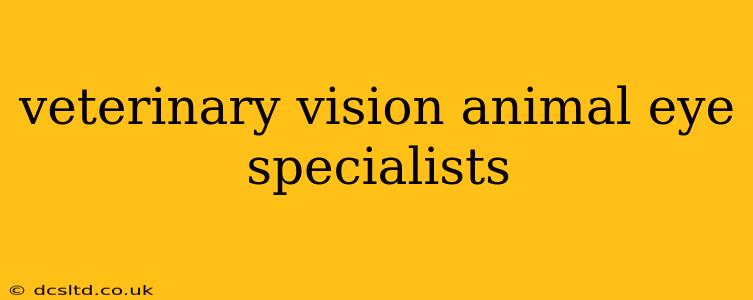Finding the right veterinary ophthalmologist for your beloved pet can feel overwhelming. This comprehensive guide explores the vital role of veterinary vision specialists and helps you understand what to look for when seeking expert care for your animal companion's eye health.
What is a Veterinary Ophthalmologist?
A veterinary ophthalmologist is a veterinarian who has completed additional years of specialized training in veterinary ophthalmology. This intensive residency focuses solely on the diagnosis, treatment, and surgical management of animal eye diseases. Unlike general practice veterinarians who may address minor eye issues, veterinary ophthalmologists possess the advanced knowledge and skills to handle complex conditions requiring specialized procedures and equipment. They are the equivalent of a human ophthalmologist, but for our animal friends.
What Eye Conditions Do Veterinary Ophthalmologists Treat?
Veterinary ophthalmologists treat a wide range of eye conditions affecting various animal species. These include, but aren't limited to:
- Glaucoma: A serious condition characterized by increased pressure within the eye, potentially leading to blindness.
- Cataracts: Clouding of the eye's lens, impacting vision clarity.
- Dry Eye (Keratoconjunctivitis Sicca): A condition where the eyes don't produce enough tears, leading to discomfort and potential corneal damage.
- Corneal Ulcers: Open sores on the cornea, requiring specialized treatment to prevent further complications.
- Retinal Degeneration: Progressive deterioration of the retina, often impacting vision.
- Eye Injuries: Trauma to the eye, requiring immediate assessment and treatment.
- Congenital Eye Defects: Eye abnormalities present at birth.
How Do I Find a Veterinary Ophthalmologist Near Me?
Locating a qualified veterinary ophthalmologist typically involves these steps:
- Online Search: Start by searching online using terms like "veterinary ophthalmologist near me," "animal eye specialist [your city/state]," or "veterinary ophthalmology [your region]".
- Veterinary Referral: Your primary care veterinarian is an excellent resource. They can refer you to a specialist based on your pet's specific needs and their familiarity with local experts.
- Specialty Veterinary Hospitals: Many large veterinary hospitals employ ophthalmologists or have established affiliations with specialists. Checking their websites is a good way to find qualified professionals.
- Professional Organizations: The American College of Veterinary Ophthalmologists (ACVO) maintains a directory of board-certified veterinary ophthalmologists. Checking their website can help you find a specialist in your area.
What Questions Should I Ask a Veterinary Ophthalmologist?
Choosing the right specialist is crucial. Before your appointment, consider these questions:
- What is your experience with [pet's specific condition]? This helps you gauge their expertise in handling the particular issue your pet faces.
- What diagnostic tests will be performed? Understanding the testing process ensures you're informed about the evaluation.
- What treatment options are available? Discuss potential treatments, their success rates, and any associated risks.
- What is the expected cost of treatment? Transparency regarding costs is essential for responsible pet ownership.
- What is the post-operative care plan (if surgery is involved)? Knowing the aftercare helps ensure your pet's recovery.
What Are the Signs of Eye Problems in Pets?
Early detection is key to successful treatment. Be vigilant for these signs:
- Squinting or excessive blinking.
- Redness or swelling of the eye.
- Cloudy or hazy appearance of the eye.
- Discharge from the eye (pus, mucus).
- Pawing at the eye.
- Sensitivity to light (photophobia).
- Changes in behavior (e.g., stumbling, bumping into objects).
What is the Difference Between a Veterinary Ophthalmologist and a General Veterinarian Regarding Eye Care?
While general veterinarians can address minor eye issues, veterinary ophthalmologists have the specialized training and equipment to handle complex conditions. They perform advanced diagnostic tests and surgical procedures beyond the capabilities of general practice veterinarians. Think of it as the difference between a general physician and an eye surgeon for humans.
By carefully considering these factors and seeking out a qualified veterinary ophthalmologist, you can provide your animal companion with the best possible eye care, ensuring their vision and overall well-being are maintained. Remember, early detection and proactive treatment are crucial for managing eye conditions effectively.
